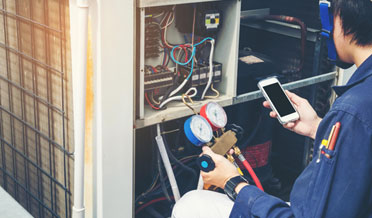Heater Maintenance Tips for Homeowners
Your furnace probably comes with a manufacturer’s warranty; but did you know that warranties can be voided if you don’t perform regular heater maintenance? Technicians usually recommend routine maintenance at installation, but how many of us actually do it?
HVAC professionals insist that regular preventative maintenance is the key to a long life from your furnace, let’s find out why.
First, you may be asking, do I need to hire a professional? There are some simple maintenance functions that a homeowner can do, such as changing the air filter and cleaning the outdoor condenser unit. However, for your safety, most other maintenance tasks should be completed by professionals with the proper experience and equipment.
Every Furnace Needs Maintenance
Whether your furnace uses natural gas/propane or electricity to provide heat, a complex system employs high voltage and mechanical components to make it all work.
Your technician will complete the following tasks on either type of system:
Electrical Component Check
- Check the thermostat settings and batteries and calibrate, if needed.
- Check the power supply since it requires high voltage.
- The system and safety controls will be thoroughly tested.
- The capacitor for the condenser fan motor is tested. It uses a lot of power.
- Replace electrical components that show wear or stress.
Mechanical Component Check
The major moving part in your system is the blower/blower motor, which moves the air volume of your entire home every few minutes. The secondary mechanical system is the heat pump.
- Clean the dust from the fins of the blower fan.
- Clean and lubricate the motor and shaft, as needed.
- Check the pulley and belt and replace if needed.
- Clean the coils on both the condenser and evaporator
- Check the coolant pressure and test the controls
Checking Air Flow
- One of the most essential maintenance tasks is changing the air filter on a regular basis. A new filter will be installed to improve the indoor air quality
- A quick inspection of supply vents and air returns will ensure adequate airflow, which is essential for comfort and proper system function.
Combustion System Check for Natural Gas or Propane Furnaces
If your system utilizes natural gas or propane, it introduces two potentially dangerous gases to your home. This requires special inspection and care to keep your home safe and your family healthy.
- The supply line and valves will be tested for leaks; there is no such thing as a small leak.
- The ignition system, either a pilot light or automatic electric ignitor, will be cleaned and tested.
- A byproduct of burning fuel is water and rust often develops on the burner. Any rust or corrosion will be cleaned.
- Another byproduct is carbon or soot; this will also be cleaned.
- The technician will complete an analysis of combustion. (A yellow flame indicates inadequate oxygen and a loss of efficiency.) This may require an adjustment to the air-to-fuel ratio.
- The airflow sensor will be cleaned and tested for proper function.
- The heat exchange chamber will be thoroughly inspected for cracks or leaks, which would allow potentially deadly carbon monoxide into the home
Your technician will be available to explain the tasks as they are completed and to answer your questions. They can also help you understand and use your programmable thermostat with a quick tutorial that should help explain the scheduling process.
Have Questions about Heater Maintenance?
Let us help with your Heater Maintenance. Call Doctor Cool & Professor Heat today at 281-338-8751 or email Doctor Cool and let our professional Residential HVAC Replacement technicians assist with all of your Heater Maintenance questions.
